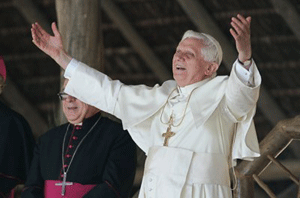|
The Rev. Mark Lewis now offers a prayer every Sunday morning that centuries ago would have been considered an homage to the enemy. It's a prayer for the bishop of Rome, the pope and all the Catholic bishops and priests. Lewis chants, "For Benedict our Pope ... Let us prayer to the Lord." And the congregation sings its answer, "Lord, have mercy." The distinctly Roman Catholic offering is the outward sign of an inner spiritual journey. St. Luke's Church in Bladensburg, Md., will become later this year the first American Episcopal Parish to convert to Catholicism, Anglicanism's one-time nemesis. "What really drew us was the apostolic authority, the oneness of the faith of the people," Lewis said "That's what we really wanted, and I don't think you have that in Anglicanism." Today, the Episcopal Church, with nearly 1.5 million members, is one of thousands of Christian denominations in the U.S. Its recent conflicts over the ordination of gays and women and the blessing of same-sex unions have caused some congregations to seek more conservative branches. But that was not an option for St. Luke's. Lewis says he felt that the same problem would persist. There was no authority concerning who would have the final interpretation of scripture over the most controversial issues the church is facing. In 2009, Pope Benedict XVI created a special Ordinariate, a path through which Anglicans could reconcile with Rome and come back to the Roman Catholic flock. In some circles it's been called the religious equivalent of sheep stealing. Deigh is happy to convert, saying, "I like it. To me, it's like going home. That's where the original church was. We are all one." Parishioner Randy King says for him the conversion brings needed certainty. "We have a church that doesn't change. We don't have to worry one day or the other what is going to be said from the pulpit." |
|
An International Missionary Outreach Dedicated to Evangelizing the Lost By Sharing The Gospel According to the Scriptures
|

Goals And Objectives
Statement Of Faith
History Of Ministry
Speaking Schedule
Letters To The Ministry
Ministry Updates
 |
|

|
Overview Of Mission South Africa |
|
 |
|
|
|



